非谓语动词详解+例句
- 格式:doc
- 大小:69.00 KB
- 文档页数:10
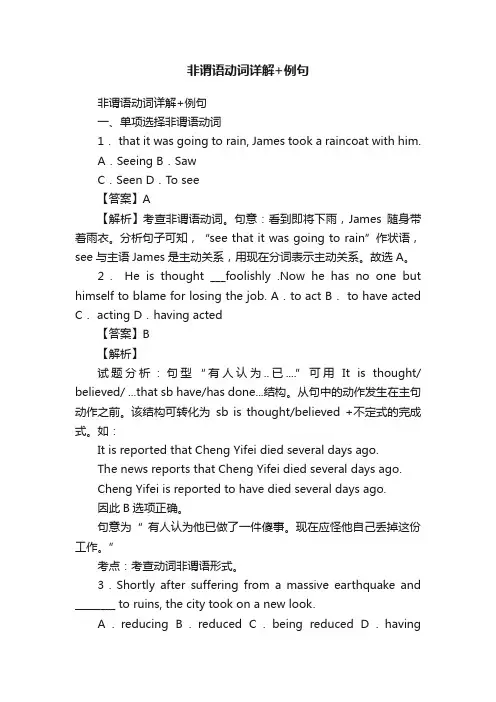
非谓语动词详解+例句非谓语动词详解+例句一、单项选择非谓语动词1. that it was going to rain, James took a raincoat with him.A.Seeing B.SawC.Seen D.To see【答案】A【解析】考查非谓语动词。
句意:看到即将下雨,James随身带着雨衣。
分析句子可知,“see that it was going to rain”作状语,see与主语James是主动关系,用现在分词表示主动关系。
故选A。
2.He is thought ___foolishly .Now he has no one but himself to blame for losing the job. A.to act B. to have acted C. acting D.having acted【答案】B【解析】试题分析:句型“有人认为..已....”可用It is thought/ believed/ ...that sb have/has done...结构。
从句中的动作发生在主句动作之前。
该结构可转化为sb is thought/believed +不定式的完成式。
如:It is reported that Cheng Yifei died several days ago.The news reports that Cheng Yifei died several days ago.Cheng Yifei is reported to have died several days ago.因此B选项正确。
句意为“ 有人认为他已做了一件傻事。
现在应怪他自己丢掉这份工作。
”考点:考查动词非谓语形式。
3.Shortly after suffering from a massive earthquake and ________ to ruins, the city took on a new look.A.reducing B.reduced C.being reduced D.havingreduced 【答案】C【解析】【详解】考查动名词的被动语态。
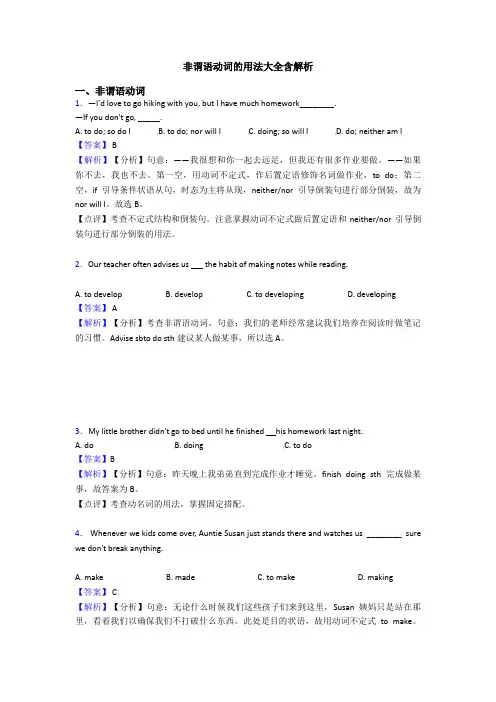
非谓语动词的用法大全含解析一、非谓语动词1.—I'd love to go hiking with you, but I have much homework________.—If you don't go, _____.A. to do; so do IB. to do; nor will IC. doing; so will ID. do; neither am I【答案】 B【解析】【分析】句意:——我很想和你一起去远足,但我还有很多作业要做。
——如果你不去,我也不去。
第一空,用动词不定式,作后置定语修饰名词做作业,to do;第二空,if 引导条件状语从句,时态为主将从现,neither/nor引导倒装句进行部分倒装,故为nor will I。
故选B。
【点评】考查不定式结构和倒装句。
注意掌握动词不定式做后置定语和neither/nor引导倒装句进行部分倒装的用法。
2.Our teacher often advises us the habit of making notes while reading.A. to developB. developC. to developingD. developing【答案】 A【解析】【分析】考查非谓语动词。
句意:我们的老师经常建议我们培养在阅读时做笔记的习惯。
Advise sbto do sth建议某人做某事,所以选A。
3.My little brother didn't go to bed until he finished his homework last night.A. doB. doingC. to do【答案】B【解析】【分析】句意:昨天晚上我弟弟直到完成作业才睡觉。
finish doing sth完成做某事,故答案为B。
【点评】考查动名词的用法,掌握固定搭配。
4. Whenever we kids come over, Auntie Susan just stands there and watches us ________ sure we don't break anything.A. makeB. madeC. to makeD. making【答案】 C【解析】【分析】句意:无论什么时候我们这些孩子们来到这里,Susan姨妈只是站在那里,看着我们以确保我们不打破什么东西。
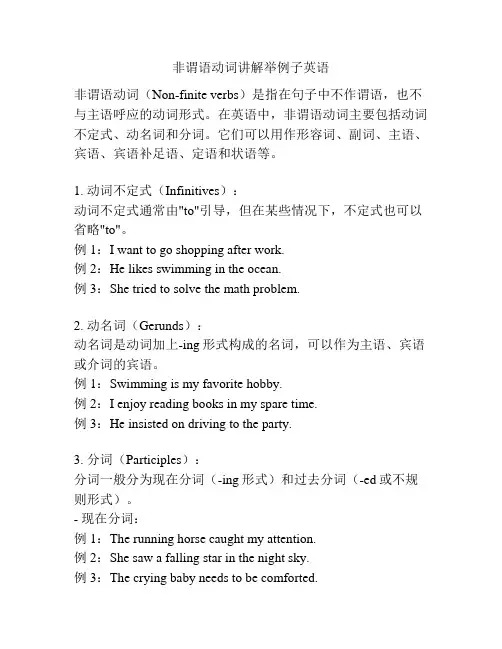
非谓语动词讲解举例子英语非谓语动词(Non-finite verbs)是指在句子中不作谓语,也不与主语呼应的动词形式。
在英语中,非谓语动词主要包括动词不定式、动名词和分词。
它们可以用作形容词、副词、主语、宾语、宾语补足语、定语和状语等。
1. 动词不定式(Infinitives):动词不定式通常由"to"引导,但在某些情况下,不定式也可以省略"to"。
例1:I want to go shopping after work.例2:He likes swimming in the ocean.例3:She tried to solve the math problem.2. 动名词(Gerunds):动名词是动词加上-ing形式构成的名词,可以作为主语、宾语或介词的宾语。
例1:Swimming is my favorite hobby.例2:I enjoy reading books in my spare time.例3:He insisted on driving to the party.3. 分词(Participles):分词一般分为现在分词(-ing形式)和过去分词(-ed或不规则形式)。
- 现在分词:例1:The running horse caught my attention.例2:She saw a falling star in the night sky.例3:The crying baby needs to be comforted.- 过去分词:例1:The broken window needs to be repaired.例2:They were fascinated by the painted landscape.例3:The stolen wallet was found by the police.非谓语动词常见的使用方式包括:1. 作为主语:例:To win the competition requires a lot of effort and practice. 例解:赢得比赛需要很多努力和练习。
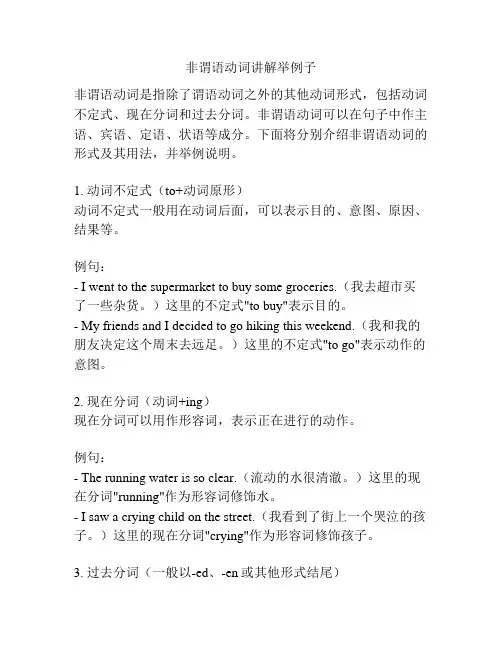
非谓语动词讲解举例子非谓语动词是指除了谓语动词之外的其他动词形式,包括动词不定式、现在分词和过去分词。
非谓语动词可以在句子中作主语、宾语、定语、状语等成分。
下面将分别介绍非谓语动词的形式及其用法,并举例说明。
1. 动词不定式(to+动词原形)动词不定式一般用在动词后面,可以表示目的、意图、原因、结果等。
例句:- I went to the supermarket to buy some groceries.(我去超市买了一些杂货。
)这里的不定式"to buy"表示目的。
- My friends and I decided to go hiking this weekend.(我和我的朋友决定这个周末去远足。
)这里的不定式"to go"表示动作的意图。
2. 现在分词(动词+ing)现在分词可以用作形容词,表示正在进行的动作。
例句:- The running water is so clear.(流动的水很清澈。
)这里的现在分词"running"作为形容词修饰水。
- I saw a crying child on the street.(我看到了街上一个哭泣的孩子。
)这里的现在分词"crying"作为形容词修饰孩子。
3. 过去分词(一般以-ed、-en或其他形式结尾)过去分词一般用作形容词,表示被动或完成的动作。
例句:- The broken window needs to be repaired.(破损的窗户需要修理。
)这里的过去分词"broken"作为形容词修饰窗户。
- She was thrilled to receive the unexpected gift.(她收到这个意外的礼物感到兴奋。
)这里的过去分词"unexpected"作为形容词修饰礼物。
非谓语动词还有其他用法,如作状语、宾语补足语等,下面是一些例子:- Being a doctor, he is always busy.(作状语)作为一个医生,他总是很忙。
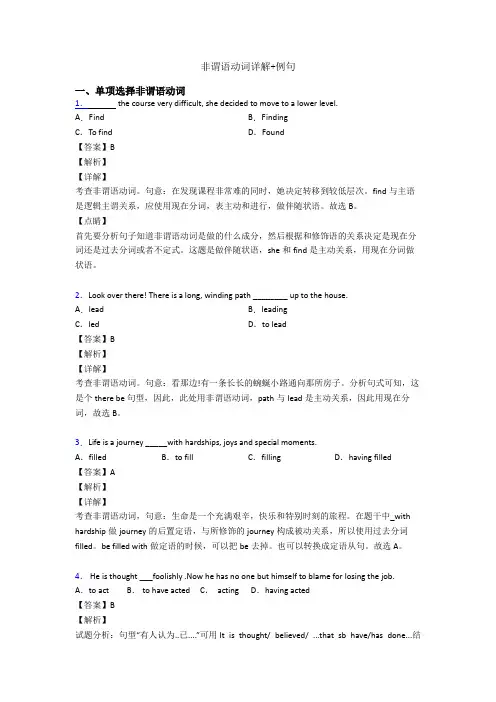
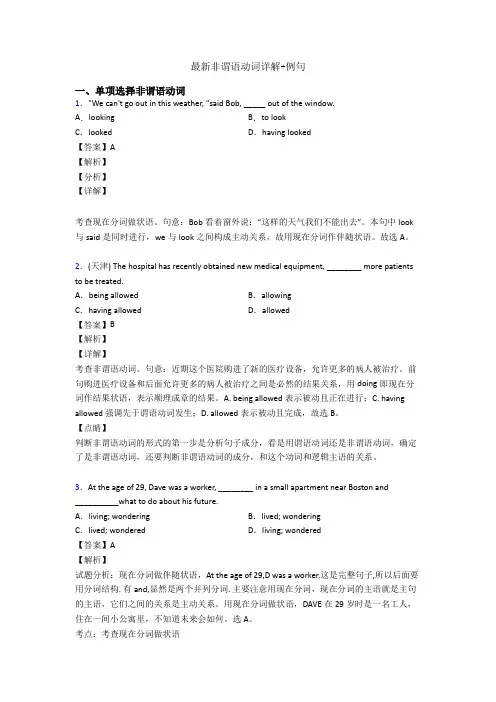
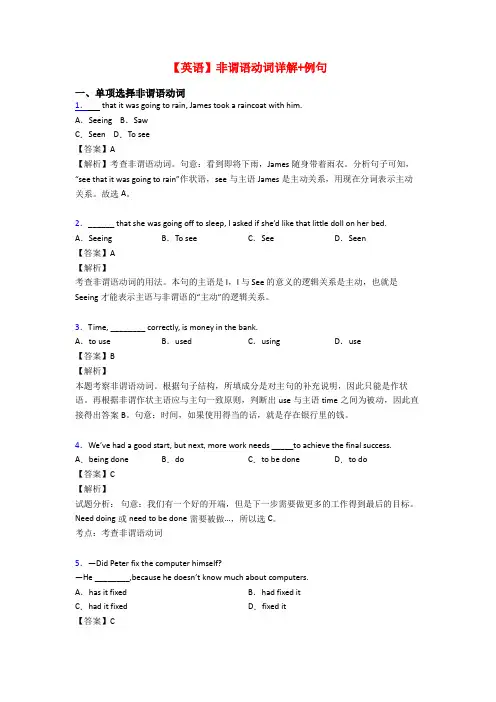
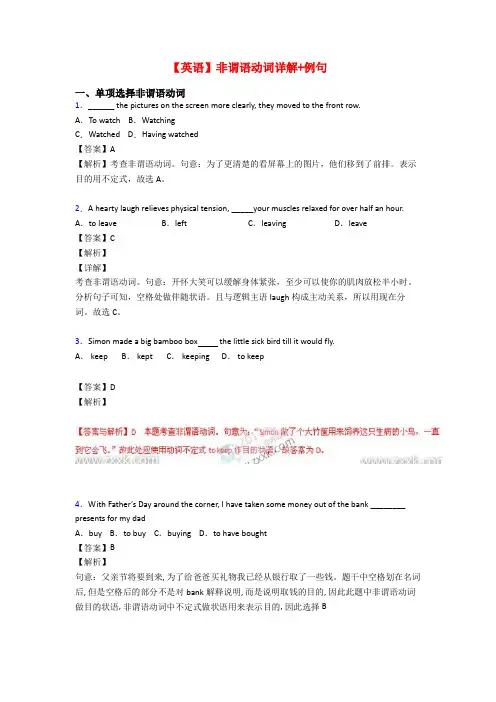
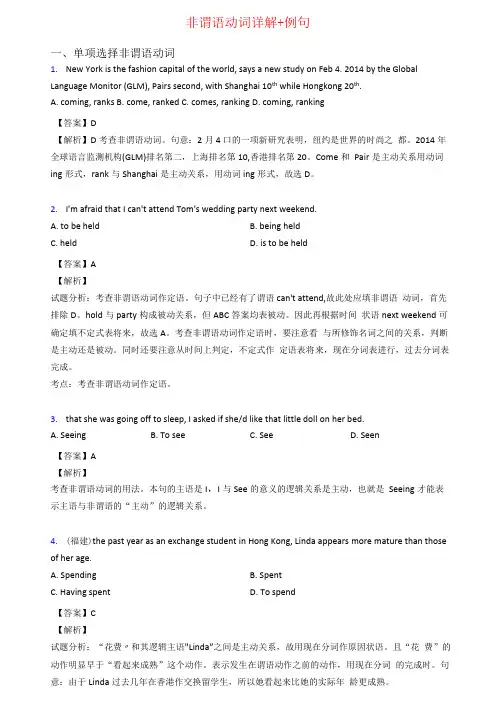
非谓语动词详解+例句一、单项选择非谓语动词1.New York is the fashion capital of the world, says a new study on Feb 4. 2014 by the Global Language Monitor (GLM), Pairs second, with Shanghai 10th while Hongkong 20th.A. coming, ranksB. come, rankedC. comes, rankingD. coming, ranking【答案】D【解析】D考查非谓语动词。
句意:2月4 口的一项新研究表明,纽约是世界的时尚之都。
2014年全球语言监测机构(GLM)排名第二,上海排名第10,香港排名第20。
Come和Pair是主动关系用动词ing形式,rank与Shanghai是主动关系,用动词ing形式,故选D。
2.I'm afraid that I can't attend Tom's wedding party next weekend.A. to be heldB. being heldC. heldD. is to be held【答案】A【解析】试题分析:考查非谓语动词作定语。
句子中已经有了谓语can't attend,故此处应填非谓语动词,首先排除D。
hold与party构成被动关系,但ABC答案均表被动。
因此再根据时间状语next weekend可确定填不定式表将来,故选A。
考查非谓语动词作定语时,要注意看与所修饰名词之间的关系,判断是主动还是被动。
同时还要注意从时间上判定,不定式作定语表将来,现在分词表进行,过去分词表完成。
考点:考查非谓语动词作定语。
3.that she was going off to sleep, I asked if she/d like that little doll on her bed.A. SeeingB. To seeC. SeeD. Seen【答案】A【解析】考查非谓语动词的用法。
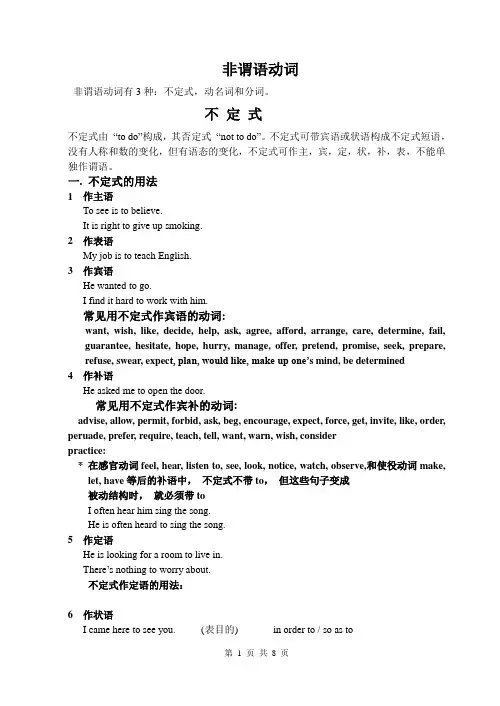
非谓语动词非谓语动词有3种:不定式,动名词和分词。
不定式不定式由“to do”构成,其否定式“not to do”。
不定式可带宾语或状语构成不定式短语,没有人称和数的变化,但有语态的变化,不定式可作主,宾,定,状,补,表,不能单独作谓语。
一. 不定式的用法1 作主语To see is to believe.It is right to give up smoking.2 作表语My job is to teach English.3 作宾语He wanted to go.I find it hard to work with him.常见用不定式作宾语的动词:want, wish, like, decide, help, ask, agree, afford, arrange, care, determine, fail, guarantee, hesitate, hope, hurry, manage, offer, pretend, promise, seek, prepare, refuse, swear, expec t, plan, would like, make up one’s mind, be determined4 作补语He asked me to open the door.常见用不定式作宾补的动词:advise, allow, permit, forbid, ask, beg, encourage, expect, force, get, invite, like, order, peruade, prefer, require, teach, tell, want, warn, wish, considerpractice:* 在感官动词feel, hear, listen to, see, look, notice, watch, observe,和使役动词make, let, have等后的补语中,不定式不带to,但这些句子变成被动结构时,就必须带toI often hear him sing the song.He is often heard to sing the song.5 作定语He is looking for a room to live in.There’s nothing to worry about.不定式作定语的用法:6 作状语I came here to see you. (表目的) in order to / so as toWe were excited to hear the news. (表原因)He hurried to the school (only) to find nobody there.(表结果7 疑问词+不定式,在句中起名词作用,可作主,宾,表He didn’t know what to say.How to solve the problem is very important.My question is when to start.8 作插入语To tell the truth, I don’t agree with you.to be sure to be frank to sum up to begin /start withto make matters worse to be brief二不定式的时态,语态1 一般式:表示的动作与谓语动作同时或在它之后发生He pretended not to know me when I met him in the street.2 进行式:表示动作发生时,不定式动作正在发生He pretended to be reading English when I entered the classroom.3 完成式:表示动作发生在谓语动作之前He is said to have learned English in Britain for a year.A railway is said to be being built now.No harm seems to have been done.四不定式的省略为避免重复可用to来代替前面的不定式,常出现在下列动词后expect, hope, wish, mean, prefer, care, forget, want, try 或出现在be glad, be happy, would like/love后eg: I haven’t been to Hong Kong, but I wish to.--- Would you come to the party?--- I’d love to, but…如果在省略不定式中含有be, have, have been 等系动词或助动词,这些词要保留。
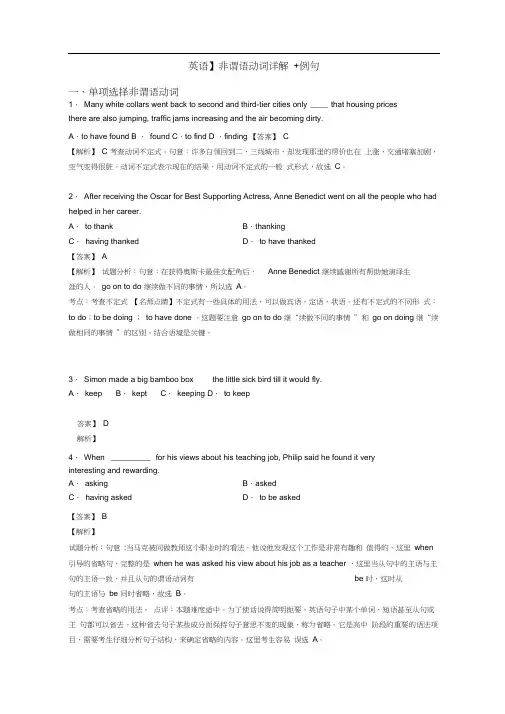
英语】非谓语动词详解+例句一、单项选择非谓语动词1.Many white collars went back to second and third-tier cities only ____ that housing pricesthere are also jumping, traffic jams increasing and the air becoming dirty.A.to have found B .found C.to find D .finding 【答案】C【解析】C 考查动词不定式。
句意:许多白领回到二、三线城市,却发现那里的房价也在上涨,交通堵塞加剧,空气变得很脏。
动词不定式表示现在的结果,用动词不定式的一般式形式,故选C。
2.After receiving the Oscar for Best Supporting Actress, Anne Benedict went on all the people who had helped in her career.A.to thank B.thankingC.having thanked D.to have thanked【答案】A【解析】试题分析:句意:在获得奥斯卡最佳女配角后,Anne Benedict 继续感谢所有帮助她演绎生涯的人。
go on to do 继续做不同的事情,所以选A。
考点:考查不定式【名师点睛】不定式有一些具体的用法,可以做宾语,定语,状语。
还有不定式的不同形式:to do;to be doing ;to have done 。
这题要注意go on to do 继“续做不同的事情”和go on doing 继“续做相同的事情”的区别。
结合语境是关键。
3.Simon made a big bamboo box the little sick bird till it would fly.A.keep B.kept C.keeping D.to keep答案】D解析】4.When _________ for his views about his teaching job, Philip said he found it veryinteresting and rewarding.A.asking B.askedC.having asked D.to be asked【答案】B【解析】试题分析:句意:当马克被问做教师这个职业时的看法。
非谓语结构与例句(一)1. try to do sth. 尽力做某事, 尝试做某事:He is trying to learn English by himself。
2. try one’s best to do sth. 尽最大努力做某事He is trying his best to learn English by himself。
3. forget to do sth 忘记做某事Don’t forget to tell Jim to come to my birthday party.4. remember to do sth. 记住要做某事Remember to turn off the lights before you leave.5. plan to do sth. 计划做某事He planned to try his best to learn English by himself。
6. hope to do sth. 希望做某事He hopes to be a diplomat in the future.7. wish to do sth. 希望做某事He wishes to learn more about the people all over the world8. learn to do sth. 学会做某事The kid has learned to walk by himself.9. want to do sth. 想做某事I want to be a lawyer when I grow up(长大)in the future.10. would like to do sth. 想做某事She would like to come to my birthday party tonight.11. would love to do sth 想做某事Iwould love to travel to the moon sometime in the future.12. It takes sb. some time to do sth It takes her half an hour to go to work on foot every day.做某事花费某人(时间) It took him half an hour to finish his homework yesterday.13 It is fun. to do sth. It’s fun ( for us) to speak to the foreigners on the phone.14. it is time to do sth. 该…做某事了It’s time (for us) to keep trying your best to learn English well.15. it is + adj to do sth 做…是…的It’s danger ous (for the kids ) to cross the road.It’s necessary (for us) to speak English as much as we can.It’s important (for everyone) to be polite to the older(对老人有礼貌)It’s interesting to play with snow and make snowmen in winter.It’s useful (for you ) to read English stories to improve your English.It’s helpful ( for the students ) to look up the new words in the dictionary.16 I find it + adj+(for sb.) to do sth. I find it dangerous (for the kids ) to cross the road.我觉得(让…)做某事是…的I find it necessary (for us) to speak English as much as we can.I find it important (for everyone) to be polite to the older(对老人有礼貌)I find it interesting to play with snow and make snowmen in winter.I find it useful (for us ) to read English stories to improve your English.I find it helpful ( for the students ) to look up the new words in the dictionary.17 there is no time to do sth.没有时间做某事There is no time ( for you ) to play.18. too……to do sth 太…而不能He walks too fast (for me) to catch up with(赶上) him.19. enough to do sth 足以…做某事I have enough money to buy a new car.We have enough food to last for another two months.The ice is thick enough to skate on it.The hall is big enough to hold 1000 people.He is old enough to go to school.20. 疑问词+to do sth. 如:what to do I don’t know what to do next.how to do it I don’t know how to do it next.where to go I don’t know where to go.which to c hoose I don’t know which book to do..21. have…to do sth. 有…要…如:I have a lot of homework to do .She has something new to tell you .22. 形容词+to do sth. 如:I’m sorry to hear that.He is scary to go out at night.23. ask sb.(not) to do sth. 请求某人(不要)做某事The teacher asked us not to be late for school again.24. tell sb.(not) to do sth. 告诉某人(不要)做某事He told me not to make so much noise.25. 4. teach sb. to do sth. 教某人做某事His mother taught him to write and read herself.26 invite sb. to do sth. 邀请某人做某事Jenny invited Li Ming to go to Canada to study.27 encourage sb. to do sth. 鼓励某人做某事Mr. Li encouraged his students to read English more loudly.28 wish sb to do sth. 希望某人做某事My family wish me to have a good future.1. have to +v 不得不做某事2. can/may/must +v 会/可以/必须做某事3. will you please +v 请你……,好吗?4. make sb. +v 使某人做某事5. see sb. +v 看见某人做某事6. hear sb. +v 听见某人做某事7. watch sb. +v 看见某人做某事8. let’s +v 让我们做……9. let me +v 让我做……10. you’d better +v 你最好……11. you’d better not +v 你最好不要……12. why not +v 为什么不…13. why don’t you +v 你为什么不…spend…(in) doing sth. 做…花费(时间或金钱) spend…on +名词. 在…上花费(时间或金钱) make sb. do sth 使某人做某事make …adj 使. ……see sb. doing sth. 看见…正在做…see sb. do sth. 看见…做(了)…watch sb. doing sth. 看见…正在做…watch sb. do sth. 看见…做(了)…hear sb. doing sth. 听见…正在做…hear sb. do sth. 听见…做(了)…get ready to do sth 准备做…, 乐意做…get ready for +名词为…做准备it is time to do sth. 该做…了it is time for +名词该做…了be busy doing sth . 忙于做…be busy with +名词忙于…be good at doing sth. 擅长做…be good at+名词擅长…thank you for doing sth. 谢谢你做…thank you for+名词谢谢…enjoy doing sth. 喜欢做…enjoy oneself 玩得高兴,过得愉快keep (on) doing sth. 坚持做…,反复做…keep sb. doing sth 让…做…keep…from doing sth 阻止…做某事keep …adj. 使…保持…stop doing sth. 停止做…, 不再做…stop to do sth. 停下来开始做…help sb.with sth. 帮助某人做某事help sb.( to) do sth. 帮助某人做某事need to do sth. 需要做…need do sth. 需要做…need doing sth. 需要被…1. finish doing sth. …完了某事2. enjoy doing sth. 喜欢做……3. hate doing sth. 讨厌做某事4. practice doing sth. 练习做某事5. like doing sth.6. keep (on) doing sth 坚持做…,反复做…7. keep sb.doing sth. 让…做某事8. see sb. doing sth.9. watch sb. doing sth.10. hear sb. doing sth11. have fun doing sth 做某事很有趣15. go on doing sth. 继续做…16. be busy doing sth . 忙于做…17. stop doing sth. 停止做…, 不再做…18. spend…(in) doing sth. 做…花费(时间或金钱) 23. 介词+ doing sth. 如:be good at doing sth.thank you for doing sth.24.做主语时(特别在be good for和be bad for句子中) Taking a walk is good for your health.Taking a walk is good for keeping healthy. Watching TV too much is bad for you。
非谓语动词讲解以及例句非谓语动词是指动词的非谓语形式,不受主语的人称和数的限制,常用作句子的宾语、定语或状语。
非谓语动词包括动名词、不定式和分词三种形式。
一、动名词(-ing形式):1. 作主语:Being kind to others is always a good thing to do.(对他人友善总是值得做的好事。
)2. 作宾语:I enjoy swimming in the ocean.(我喜欢在海里游泳。
)3. 作宾补:She made a decision, ending their relationship.(她做出了一个决定,结束了他们的关系。
)4. 作定语:The running water is so clear and refreshing.(流动的水非常清澈和令人神清气爽。
)5. 作状语:Knowing the answer, he raised his hand.(知道答案后,他举手了。
)二、不定式(to + 动词原形):1. 作主语:To learn a new language is challenging but rewarding.(学习一门新语言是具有挑战性但值得的。
)2. 作宾语:She wants to visit Paris next year.(她想明年去巴黎旅游。
)3. 作宾补:I need to finish this report by tomorrow.(我需要明天之前完成这份报告。
)4. 作定语:He is the best person to ask for help.(他是寻求帮助的最佳人选。
)5. 作状语:She went to the library to study.(她去图书馆学习。
)三、分词:1. 现在分词(-ing形式):The crying baby woke up the entire neighborhood.(哭闹的婴儿吵醒了整个社区。